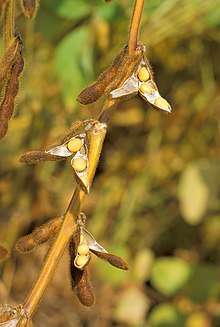Douhua
Douhua (Chinese: 豆花; pinyin: dòuhuā) is the short form of doufuhua (Chinese: 豆腐花; pinyin: dòufuhuā). It is a Chinese snack made with very soft tofu. It is also referred to as tofu pudding and soybean pudding.
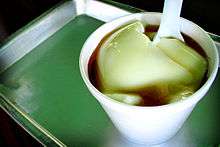 Shanshui tau fu fa (山水豆腐花) — soy curd with sugar syrup — as sold on Lantau Island, Hong Kong. | |
| Alternative names | Doufuhua, tofu pudding, soybean pudding |
|---|---|
| Type | Snack |
| Place of origin | China |
| Region or state | East Asia and Southeast Asia |
| Main ingredients | Tofu |
| tofu pudding | |||||||||||||||||||||
|---|---|---|---|---|---|---|---|---|---|---|---|---|---|---|---|---|---|---|---|---|---|
| Chinese | 豆腐花 | ||||||||||||||||||||
| Literal meaning | bean curd flower | ||||||||||||||||||||
| |||||||||||||||||||||
| Alternative Chinese name | |||||||||||||||||||||
| Traditional Chinese | 豆腐腦 | ||||||||||||||||||||
| Simplified Chinese | 豆腐脑 | ||||||||||||||||||||
| Literal meaning | bean curd brain | ||||||||||||||||||||
| |||||||||||||||||||||
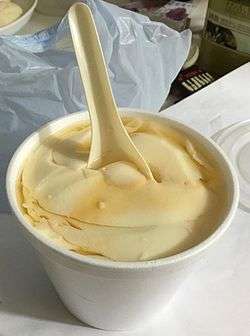
History
Tofu or doufu (Chinese: 豆腐; pinyin: dòufu/dòu fǔ[1]) is thought to have originated in ancient China during the Western Han Dynasty. Chinese people have developed and enriched the recipes for tofu dishes on the basis of their own tastes, such as mapo tofu, stinky tofu, pickled tofu, steamed tofu and uncongealed tofu pudding, etc.[2]
Traditions
Northern Chinese cuisine
In northern China, douhua is often eaten with soy sauce, thus resulting in a savory flavor. Northern Chinese often refer to douhua as doufunao (豆腐脑; dòufunǎo; 'tofu brains', often shortened to 豆脑; dòunǎo). Local Beijing people usually eat doufunao for breakfast together with eggs or youtiao (fried dough sticks). Doufunao can be found at breakfast stands along the streets in the morning. Other times it is hard to find outside of a restaurant.[3]
Sichuan cuisine
Douhua in Sichuan is often made without any sugar at all, then served by carrying pole or bicycle vendors with a number of condiments such as chili oil, soy sauce, Sichuan pepper, scallions, and nuts, and is sometimes eaten along with white rice as well.
Hubei cuisine
Douhua is served with sugar in Hubei. It is referred to as either doufunao (Simplified Chinese: 豆腐脑; pinyin: dòufunǎo) or doufuhua (Chinese: 豆腐花; pinyin: dòufuhuā).
Cantonese cuisine
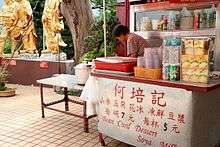
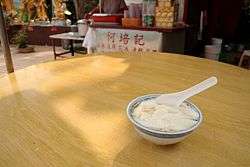
In Cantonese cuisine, tau fu fa (Chinese: 豆腐花; Cantonese Yale: dauh fuh fā) is served with sweet ginger or clear syrup, and sometimes as a mixture with black sesame paste, and sometimes also with coconut milk. Traditionally it is made in a wooden bucket, and sold as wooden bucket tofu pudding (Chinese: 木桶豆腐花; Cantonese Yale: muhk túng dauh fuh fā) as part of dim sum cuisine.
Taiwanese cuisine
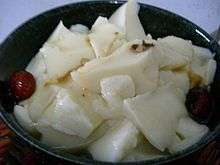
In Taiwanese cuisine, douhua is served with sweet toppings like cooked peanuts, adzuki beans, cooked barley, tapioca, mung beans, and a syrup flavored with ginger or almond. During the summer, douhua is served with crushed ice; in the winter, it is served warm.
Southeast Asian cuisine
Filipino cuisine
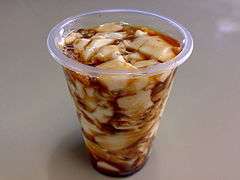
In the Philippines, fresh silken tofu served in sweet brown syrup is known as taho and sold by hawkers in the mornings, usually door-to-door and in public plazas, or outside churches. In some regional variations, taho is often served with sugarcane syrup or strawberry syrup.
Indonesian cuisine
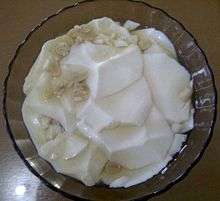
In Indonesia, it is known as Kembang tahu or in Java as Tahwa derived from the Chinese Hokkien name Tau Hwe, or Wedang Tahu (Wedang means hot water with ginger, Tahu means tofu) and is usually sold by hawkers. It is served warm or cold with palm sugar syrup that has been flavored with pandan leaves and ginger.
Malaysian and Singaporean cuisine
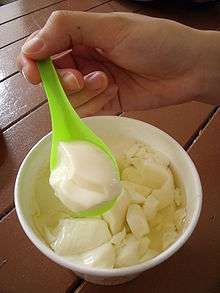
In Malaysia and Singapore, it is more commonly known by its names tau hua or tau huay in Hokkien, or by the Cantonese name (tau fu fa), with the Cantonese variation being more common in Malaysia. In Penang, the common term is tau hua, due to Hokkien being its dominant local Chinese language.
It is usually served either with a clear sweet syrup alone, with ginkgo seeds suspended in the syrup, or in a sugar syrup infused with pandan. Alternatively, it can also be served with palm-syrup (Gula Melaka).
Thai cuisine
In Thailand, it is known by its Chinese Hokkien name taohuai (เต้าฮวย). It is usually served cold with milk and fruit salad, which is known as taohuai nom sot (เต้าฮวยนมสด, literally "douhua in fresh milk") or taohuai fruit salad (เต้าฮวยฟรุตสลัด), or served hot with ginger syrup, which is known as taohuai nam khing (เต้าฮวยน้ำขิง).
Vietnamese cuisine
In Vietnam, it is known as tàu hủ nước đường, tàu hủ hoa or tào phớ, đậu hủ, tàu hủ. It varies in three regions in Vietnam:
- Northern region — served with jasmine infused sugary water. It is enjoyed as warm in winter and cold with ice in summer.
- Central region — cooked with spicy ginger. Sugar is added. Douhua pieces are usually unshaped because of their softness.
- Southern region — served warm with lychee and coconut water. Ginger is optional. Douhua pieces are firmer than those in the North and the Central.
Packaged
The dessert is also sold in North American Asian supermarkets in plastic containers.
Requirements
Like all tofu, douhua must have a coagulant, often gluconolactone for smoothness as compared with other coagulents.
See also
| Wikimedia Commons has media related to Soybean pudding. |
- Dim sum
- Tofu
- Taho
- List of tofu dishes

References
- 教育部簡編國語辭典修訂本.
【豆腐】 注音 ㄉㄡˋ ㄈㄨˇ 漢語拼音 dòu fǔ
- Mary Bai (2011-10-19). "Tofu, a Healthy Traditional Food in China". China International Travel Service Limited. Archived from the original on 2011-12-25. Retrieved 2012-02-07.
- "Dou Fu Nao". Yeschinatour.com. Archived from the original on 6 August 2014. Retrieved 30 July 2014.

